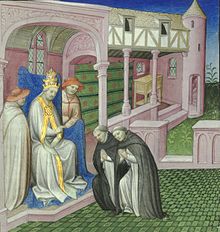Nicholas IV (Pope)
Nicholas IV (born September 30, 1227 in Lisciano (district of Ascoli Piceno ), † April 4, 1292 in Rome ) was Pope from February 22, 1288 until his death .
Life
Born Girolamo Masci d'Ascoli , he entered the Franciscan Order at an early age and became Provincial of Dalmatia in 1272 and General of the Order in 1274. On March 12, 1278 he was elevated to cardinal priest of Santa Pudenziana and on April 12, 1281 to cardinal bishop of Palestrina .
After the death of his predecessor Honorius IV , there was an almost one year vacancy . It came about not only through the disagreement of the college of cardinals, but rather through the rampant malaria in Rome at the time , which cost the lives of some of the cardinals and forced a temporary suspension of the conclave .
Nicholas IV was the first Franciscan to be elected Pope; however, Nicholas III was also . as one of its immediate predecessors, patron and friend of the order.
The new Pope continued the Sicilian policy of his predecessors and declared the renunciation of Charles II of Naples to the crown of Sicily invalid. By the Treaty of Champfranc on October 28, 1288 Charles II was released. He had also undertaken in the treaty to reconcile Aragon with the Pope and France. But Pope Nicholas only forced the (theoretical) Sicilian royal crown on him on May 28, 1289. Out of a sense of honor, Charles II returned to the border of Aragon four months after his coronation and after the failure of his peace efforts to return to prison. Since no one was interested in being taken prisoner again, his honor was saved and Karl returned to France. There he succeeded in the peace treaty of Senlis on May 19, 1290, in which Karl von Valois renounced all of his claims to Aragon. The Pope's attitude towards the Kingdom of Naples did not change this. After the death of Alfonso III. of Aragon on June 18, 1291, under his heir James II, Aragon and Sicily were united in personal union. Jacob's brother Friedrich became its governor in Sicily. Thereupon the Pope imposed the excommunication on both of them, which, however, remained ineffective.
On May 18, 1291, the last Crusader base in the Holy Land fell with Acre . With this the medieval crusade movement died out.
During his four-year pontificate , Nicholas IV emerged as a promoter of the mission . His attempts to organize a new crusade , however, failed. On Palm Sunday 1288 he received Rabban Bar Sauma , a Nestorian monk who, as the envoy of Ilkhan Arghun, was supposed to bring about an alliance between the Mongols in Persia and the Christian West against the Mamluks .
Above all, his renovations and additions to the apse mosaics in S. Giovanni in Lateran - where he added St. Francis and Antony and himself while retaining the core of the old mosaic - and in S. Maria Maggiore; there he also had mosaics attached to the facade, which is now covered. Pope Nicholas was also the founder of the Universities of Montpellier and Lisbon .
He was buried in the then still called Basilica Liberiana S. Maria Maggiore (tomb of Domenico Fontana ).
literature
- Otto Schiff, Studies on the History of Pope Nikolaus IV (Historical Studies 5), Berlin 1897
- Gerhard Diehl: Nikolaus IV. In: Biographisch-Bibliographisches Kirchenlexikon (BBKL). Volume 6, Bautz, Herzberg 1993, ISBN 3-88309-044-1 , Sp. 869-871.
- Giulia Barone : Niccolò IV, papa. In: Raffaele Romanelli (ed.): Dizionario Biografico degli Italiani (DBI). Volume 78: Natta – Nurra. Istituto della Enciclopedia Italiana, Rome 2013.
- Giulia Barone: Niccolò IV . In: Enciclopedia dei Papi , Rome 2000.
See also
Web links
- Masci, Girolamo. In: Salvador Miranda : The Cardinals of the Holy Roman Church. ( Florida International University website), accessed July 22, 2016.
- Entry on Girolamo Masci on catholic-hierarchy.org ; Retrieved July 22, 2016.
- Publications on Nicholas IV in the Opac of the Regesta Imperii
| predecessor | Office | successor |
|---|---|---|
| Honorius IV. |
Pope 1288-1292 |
Celestine V. |
| Erard de Lessines |
Cardinal Bishop of Palestrina 1281–1288 |
Bernardo V. Berardi di Cagli |
| personal data | |
|---|---|
| SURNAME | Nicholas IV |
| ALTERNATIVE NAMES | Girolamo Masci d'Ascoli; Jerome of Ascoli |
| BRIEF DESCRIPTION | Pope (1288-1292) |
| DATE OF BIRTH | September 30, 1227 |
| PLACE OF BIRTH | Lisciano |
| DATE OF DEATH | April 4, 1292 |
| Place of death | Rome |
